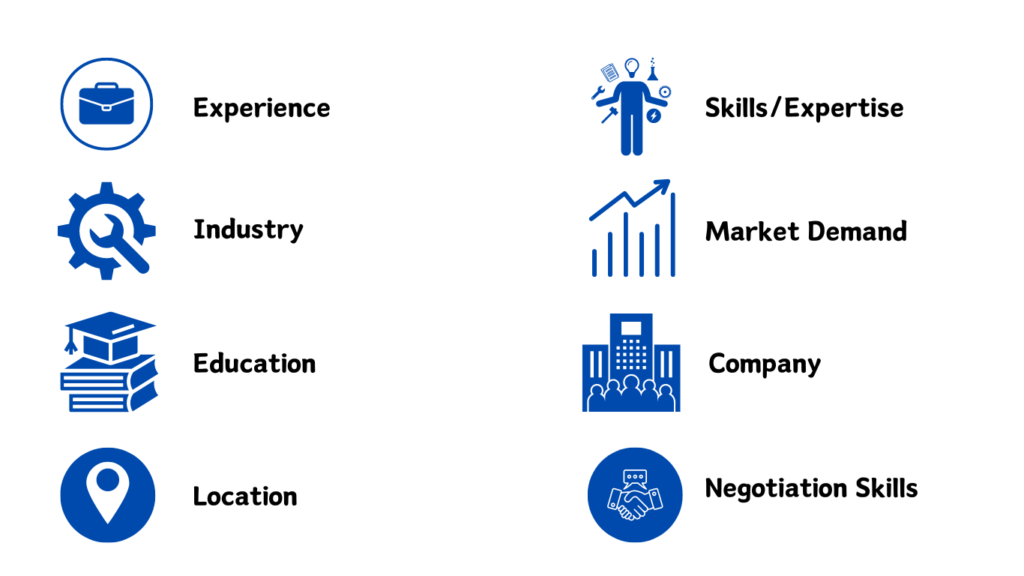In this fast paced world and with the rapidly changing job market, it becomes crucial for students to stay qualified and updated with the in demand courses.
Right after high school, the pressure builds up on students as to what to study and which career path to choose. It is important for students to research and explore various options before making a decision.
In this article, we will discuss the top information technology (IT) courses for 2025 that are projected to be in high demand and offer promising career opportunities. By staying informed about these courses, students can make more informed decisions about their future education and career paths.
Before we move forward with the top IT courses of 2025, I would like you to know that there are many factors that depend upon the salaries for these courses.

Therefore, before comparing your salaries, make sure you understand the factors and their dynamics.
1) Data Science
Have you heard this line before?
“Data is the new oil.”
In saying this, British mathematician Clive Humby was implying that data is the new and vital resource available to us in this modern era.
And from this data, data science is derived.
No, data science has nothing to do with oil drilling or fossil fuels.
Instead, the study of data to derive important business insights is known as data science.
To analyze massive volumes of data, it is a multidisciplinary technique that blends ideas and methods from computer engineering, artificial intelligence, statistics, and mathematics.
Questions like what happened, why it happened, what will happen, and what can be done with the outcomes are some of the questions that this analysis aids data scientists in asking and answering.
This is a field that is rapidly growing in importance as businesses seek to make data-driven decisions and gain a competitive edge in their industries.
With the increasing amount of data being generated daily, data science skills are in high demand across various sectors, making them a lucrative career choice for aspiring professionals in the tech industry.
What skills are taught in data science courses?
Data science courses typically cover skills such as programming languages like Python and R, statistical analysis, machine learning techniques, data visualization, and data manipulation.
These skills are essential for professionals to effectively analyze and interpret large sets of data to make informed decisions and predictions.
What is the salary of a data scientist in India?
The average salary ranges from 6–10 lakhs per annum for entry-level positions to 15–30 lakhs per annum for experienced professionals in India. This salary range can vary depending on the industry, location, and level of expertise of the data scientist.
What are the career opportunities in data science?
There are plenty of career opportunities in the field of data science. You can become
- Data Analyst
- Data Scientist
- Business Intelligence Analyst
- Data Engineer
- Data Architect
- Chief Data Officer (the highest rank in data science, of course)
Are a data scientist and a data analyst the same?
While data scientists and data analysts both work with data, they have different roles and responsibilities.
Data scientists typically focus on developing algorithms and predictive models, while data analysts focus on interpreting and analyzing data to provide insights for decision-making.
Both roles are important in the field of data science, but they require different skill sets and expertise.
2) Block Chain Development
What comes to mind when you hear the term “block chain”?
Let me guess: Bitcoin, right?
Well, yes, this is the technology used behind Bitcoin, but blockchain is actually a decentralized and secure way of storing data in a chain of blocks. It has the potential to revolutionize various industries beyond just cryptocurrency.
Block chain development involves creating and implementing decentralized digital ledgers for secure and transparent transactions.
This technology is becoming increasingly popular in industries such as finance, healthcare, and supply chain management due to its ability to enhance security and efficiency.
Where can I learn about block chain technology or block chain development?
There are numerous online courses, workshops, and tutorials available that can provide in-depth knowledge and hands-on experience with blockchain technology. Coursera, Edx, and Simplilearn are some popular platforms that offer courses from beginners to advanced in block chain technology.
What skills are taught in block chain development?
In blockchain development courses, you can expect to learn skills such as
- Smart Contract Development
- Decentralized Application (DApp) Creation
- Cryptography
- Consensus Algorithms
What is the salary of a block chain developer in India?
On average, a blockchain developer in India can earn anywhere from INR 5–20 lakhs per annum, with experienced professionals earning even higher salaries.
What are the career opportunities in block chain development?
- Blockchain Developer
- Blockchain Architect
- Smart Contract Developer
- Blockchain Consultant
- Blockchain Project Manager
3) Cyber Security
The process of protecting networks, computers, servers, mobile devices, electronic systems, and data from hostile intrusions and malicious attacks is known as cyber security.
It is often referred to as electronic information security or information technology security.
Where can I learn about cyber security?
Although many online platforms as well as vocational colleges provide cyber security training, it is recommended to look for accredited programs or certifications from organizations like CompTIA, EC-Council, or ISC2.
I find TryHackMe to be one of the best cyber security training institutes for all types of learners, from beginners to advanced professionals. Their hands-on labs and interactive challenges make learning about cyber security engaging and practical.
What skills are taught in cyber security training?
In cyber security training, you can expect to learn skills such as
- Network Security
- Ethical Hacking – this is not the type of hacking you are thinking about.
- Cryptography
- Incident Response
- Risk Management
What is the salary of a cyber security engineer in India?
A cyber security engineer in India can earn between 6-12 lakhs per annum. The average salary stands anywhere between 5-6 lakhs per annum, and the entry level salary is about 3–4 lakhs per annum. Keep in mind that salaries can vary depending on experience, location, and the specific company.
What are the career opportunities in cyber security?
- Security Analyst
- Penetration Tester
- Security Consultant
- Chief Information Security Officer
4) Artificial Intelligence and Machine Learning (AI/ML)
AI/ML can be divided into two parts – artificial intelligence and machine learning – ofcourse!
Artificial Intelligence (AI) is an extensive domain of computer science that concentrates on developing computers capable of executing activities that would ordinarily necessitate human intelligence.
These responsibilities encompass comprehending normal language, identifying patterns in data, solving intricate issues, and even making decisions.
Machine Learning (ML) is a branch of Artificial Intelligence (AI) that focuses on instructing computers to acquire knowledge from data and enhance their performance without the need for explicit programming.
Machine learning algorithms, in essence, scrutinize vast quantities of data, detect patterns, and subsequently generate predictions or judgments based on this analysis.
AI and ML are enabling automation, optimization, and the development of intelligent systems, and they are transforming a number of industries. They are useful in a variety of industries, including retail, banking, healthcare, and transportation.
Where can I learn about artificial intelligence and machine learning?
Numerous websites offer free, simple, and beginner-friendly AI and ML tutorials like deeplearning.ai. You might want to consider taking master’s degree programs and certification programs offered by Stanford, MIT, and IITs if you wish to work in AI/ML as a professional.
What skills are taught in an artificial intelligence and machine learning course?
Some of the skills taught in artificial intelligence and machine learning courses include
- Python ( programming language)
- Data Analysis
- Statistical Modeling
- Algorithm Development
Students also learn about neural networks, deep learning, natural language processing, and reinforcement learning techniques to apply in real-world scenarios.
What is the salary of an artificial intelligence and machine learning (AI/ML) professional in India?
Average base pay ranges from 6-14 lakhs per annum. While a professional with experience can get anywhere between 15-30 lakhs per annum, depending on the company and role.
The demand for AI/ML professionals is expected to increase in the coming years, leading to potential salary growth opportunities.
What are the career opportunities in artificial intelligence and machine learning (AI/ML)?
- Data scientist
- Machine Learning Engineer
- AI Researcher
- AI Consultant
- Research Scientist
5) Big Data
The data on your mobile phone is commonly called data.
But the same data from 10000000 mobile phones is called “BIG DATA.”
I guess you got it.
Big data is the term used to describe extraordinarily vast and varied sets of semi-structured, unstructured, and organized data that keep growing rapidly over time.
Conventional data management systems are unable to store, handle, and evaluate these datasets because of their enormous size and complexity in volume, velocity, and variety.
Well I call it Big Daddy!
What is the term for a person who works with big data?
The person in charge of designing, developing, testing, and maintaining intricate data processing systems that handle massive data sets is known as a big data engineer in the field of information technology (IT).
Where can I learn about big data?
There is no one technology like big data that can be mastered in a month. The term “Big Data” refers to an overall term for a wide range of interrelated technologies and tools.
Many online platforms offer courses and certifications in big data, such as Coursera, Udemy, and edX. These courses cover topics such as data analytics, data mining, machine learning, and more to help individuals gain a comprehensive understanding of big data technologies and how to work with them effectively.
Tip- Make a flowchart for learning about big data, starting with basic concepts and gradually progressing to more advanced topics. This will help you track your progress and ensure you are building a solid foundation in the field.
What skills are taught in big data?
- Data Analysis
- Data Visualization
- Python and R (programming languages)
- Database Management
- Statistical Modeling
What is the salary of a big data engineer in India?
Freshers salaries for big data engineers can range from 4–8 lakhs per annum. On average, a mid-level big data engineer in India can expect to earn between 10-20 lakhs per annum. Keep in mind that salaries may be higher for those with advanced skills and certifications in big data technologies.
What are the career opportunities in big data?
- Data Scientist
- Data Analyst
- Business Intelligence Analyst
- Data Engineer
- Machine Learning Engineer
6) Cloud Computing
Cloud computing is the on-demand provisioning of computer system resources, particularly processing power and data storage, without the need for direct user management.
What does a cloud computing engineer do?
A specialist in cloud computing engineering is in charge of developing, putting into practice, and overseeing cloud-based infrastructure and services for a company. Their main goal is to maximize performance, scalability, and dependability while cutting expenses and increasing efficiency by utilizing cloud technology.
Where can I learn about cloud computing?
Here are a few of the top websites for learning about cloud computing from A to Z:
What skills are taught in cloud computing?
- Virtualization
- Networking
- Security
- Automation
- Containerization
What is the salary of a cloud computing engineer in India?
The salary of a cloud computing engineer in India ranges from INR 3-12 lakhs per annum, depending on experience and expertise. The average salary is around 7-8 lakhs per annum.
With the increasing demand for cloud professionals in the industry, salaries are expected to rise further in the coming years.
What are the career opportunities in cloud computing?
- Cloud Solutions Architect
- Cloud Engineer
- DevOps Engineer
- Cloud Consultant
7) Internet Of Things (IOT)
The term “Internet of Things” refers to both the collective network of interconnected devices and the technology that makes it easier for devices to communicate with each other and the cloud.
The internet of things, to put it simply, is a technology that enables us to attach a device to an inert object (cars, electrical systems in plants, roofs, lights, etc.) that can assess environmental parameters, produce related data, and send it over a communications network.
Where can I learn about the Internet of Things (IOT)?
You can learn about the Internet of Things (IOT) through online courses, workshops, and certifications offered by technology organizations and educational institutions.
- Youtube
- Udemy
- Cousera
- 360 DigiTMG
What skills are taught in the Internet of Things (IOT)?
Skills taught in Internet of Things (IOT) courses typically include
- Programming languages like Python and C++
- Data Analytics
- Sensor Technology
- Cloud Computing
- Cybersecurity
What is the salary of an Internet of Things (IOT) engineer in India?
IoT engineers’ salaries range anywhere between 2-11 lakhs per annum, with an average of 5.5 lakhs per annum.
What are the career opportunities in the Internet of Things (IOT) ?
- IoT Developer
- IoT Solution Architect
- IoT Project Manager
- IoT Data Scientist
- IoT Security Specialist
8) DevOps and Continuous Integration/Continuous Deployment (CI/CD)
Two related software development concepts, DevOps and Continuous Integration/Continuous Deployment (CI/CD), work together to automate, collaborate, and adopt cultural practices that will expedite the development, deployment, and operation of software applications.
DevOps:
DevOps is a cultural and organizational approach that promotes collaboration and communication across software development (Dev) and IT operations (Ops) teams. DevOps’ major purpose is to break down silos, increase productivity, and deliver high-quality software products more quickly and consistently.
Continuous Integration/Continuous Deployment (CI/CD):
CI/CD is a set of methods and tools that make it possible to automate the whole process of delivering software, from changing code to putting it into production. Continuous Integration (CI), Continuous Delivery (CD), and Continuous Deployment (also CD) are all parts of it.
Where can I learn about DevOps and Continuous Integration/Continuous Deployment (CI/CD)?
DevOps can be learned on the following platforms:
Continuous Integration/Continuous Deployment (CI/CD) can be learned on the following platforms:
What skills are taught in DevOps and Continuous Integration/Continuous Deployment (CI/CD)?
- Version Control
- Infrastructure as Code (IaC)
- Automation Tools
- Containerization
- Monitoring
What is the salary of DevOps and Continuous Integration/Continuous Deployment (CI/CD) engineers in India?
The salary of a DevOps and CI/CD engineer in India can range from ₹6,00,000 to ₹18,00,000 per year, depending on experience and skills. These professionals are in high demand due to their expertise in streamlining software development processes and improving overall efficiency.
What are the career opportunities in DevOps and Continuous Integration/Continuous Deployment (CI/CD)?
- DevOps Engineer
- Site Reliability Engineer (SRE)
- Release Manager
- Automation Architect
9) UX/UI Design
UX/UI stands for user experience (UX) and user interface (UI).
A UI/UX engineer, sometimes called a UI/UX designer or just a UX engineer, is a professional who makes user interfaces (UI) and user experiences (UX) for digital goods like websites, mobile apps, and software.
They are very important for making sure that digital products are easy to understand, use, and look good so that they meet the needs and wants of end users.
On the whole, this is a more creative than technical field.
Where can I learn about UX/UI design?
There are many online courses, programs, and certifications available that can teach you the fundamentals of UX/UI design.
- Coursera in association with Google
- Code Academy
- Great Learning
- Youtube (the best of all)
What skills are taught in UI/UX design?
- User Research
- Wireframing
- Prototyping
- Usability Testing
- Visual Design
What is the salary of a UI/UX engineer in India?
The average base pay ranges from 4–8 lakhs per annum. With experience and expertise, the salary can go up to 15-20 lakhs per annum in India.
What are the career opportunities in UI/UX?
- UX Designer
- UI Designer
- Interaction Designer
- User Researcher
Which is better- free courses or paid courses?
As we see, most of the courses do not require any major professional degrees and they highly depend upon your skills and expertise.
Therefore, try to gain skills and expertise into the field through hands-on projects and continuous learning to increase your job opportunities and salary potential.
You can either choose free platforms like youtube or paid platforms for these courses.
Keep in mind that studying on either of the two types of platforms is identical and you won’t be missing out on any valuable information by choosing a free platform over a paid one. Ultimately, what matters most is the knowledge and skills you acquire, not how much you paid for the certification.
The only advantage which paid courses have over free is that you get a designed syllabus right from beginner to advanced.
Whereas on free courses you might have to struggle (sometimes) between the different videos and resources to find the appropriate level of content.
So it all depends upon you how well you learn and utilize the resources available to you and get the most out of your learning experience.
Happy Learning.




